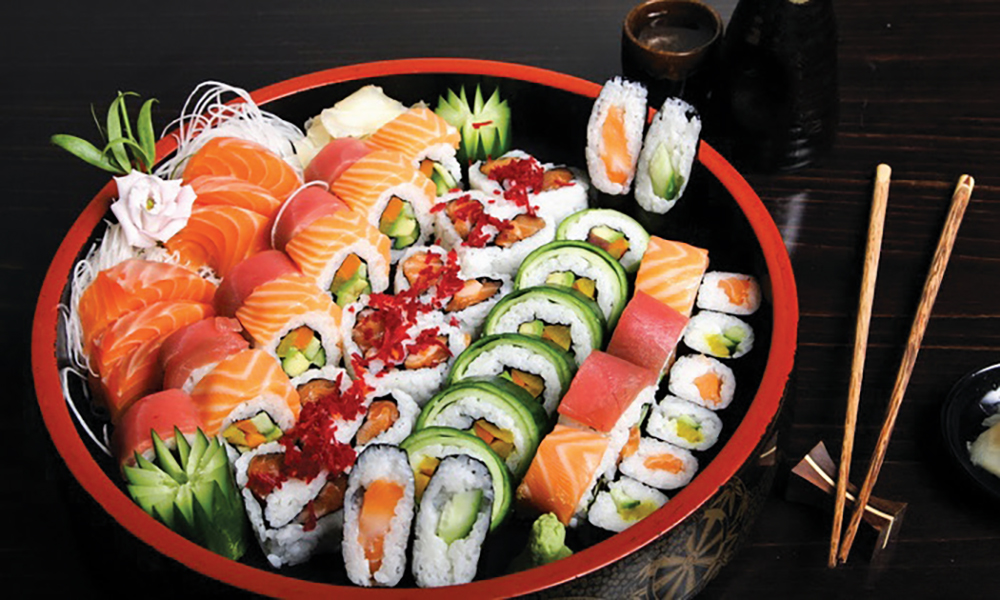
The Jachter family loves to eat at and from Mashu Mashu sushi in Fair Lawn (under RCBC supervision). They enjoy the décor at the store and the delivery to our home in Teaneck. My 19-year-old son Binyamin in particular I think would eat only Mashu Mashu sushi for breakfast, lunch and dinner to the exclusion of all else if given the choice. Binyamin reports from Yeshivat Shaalvim that his favorites are the Salmon Lover Roll and the Ninja Roll. Just contact Binyamin and he will offer a full analysis of pretty much everything on the Mashu Mashu menu. He has tried, and baruch Hashem enjoyed, the entire Mashu Mashu menu from beginning to end. While Mashu Mashu delivers to all of the Jewish communities in the broader area, it does not yet deliver to Israel, where my son is learning for his second year, so he is on break from Mashu Mashu for a while.
Full disclosure: Mashu Mashu co-owner is Nissan Shavit, our trusty assistant gabbai at Congregation Shaarei Orah, the Sephardic Congregation of Teaneck.
One halachic challenge faced by Mashu Mashu customers is regarding the proper bracha on sushi. In order to grasp the issue at hand, we need to delve a bit into the rules of ikar and tafel.
Ikar V’tafel
The Mishna (Brachot 44a) articulates a cardinal rule regarding the laws of brachot: When there is a mixture of foods, one makes a bracha on the “primary ingredient” (ikar) and thereby is exempted from reciting a bracha on the “secondary ingredient” (tafel). Acharonim (including Rav Soloveitchik and the Chazon Ish, Orach Chaim 27) have analyzed the nature of this rule. They question if in principle the tafel requires a bracha, but the bracha uttered on the ikar is considered as effective for the tafel or, perhaps by definition, the tafel does not require a bracha simply because it is too insignificant to warrant a bracha. The example given by the Mishna is particularly instructive—that if one eats bread merely to soften the taste of salty food he is eating, he makes a bracha only on the salty food. We see that even bread can be classified as tafel.
It is often difficult to determine which component of a mixture is ikar and which is tafel. Indeed, the laws of ikar and tafel are numerous and complex; see Shulchan Aruch Orach Chaim chapters 208 and 212, Rav Pinchas Bodner, “The Halachot of Brachos,” pp. 53-81, Rav Binyamin Forst, “Laws of Brachos,” pp. 205-228, Rav David Willig, Am Mordechai, pp. 202-208 and Yalkut Yosef, Hilchot Brachot, for summaries of this issue. The three basic rules are that (1) one goes by volume—the biggest ingredient is considered the ikar, (2) if one ingredient clearly comes to serve the other, the former is a tafel, (3) the ikar is the ingredient that the individual prefers.
The Bracha on Sushi
It is difficult to determine what is the ikar and tafel in the context of sushi. Not surprisingly, there has emerged a variety of opinions. My respected colleague and friend Rav Aryeh Lebowitz summarizes and analyzes the divergent opinions in the second volume of his wonderful sefer titled “HaKoneh Olamo.” For listeners of Rav Lebowitz’s Ten Minute Halacha, one may download his discussion of this topic within this superb resource as well.
Three opinions have emerged. One opinion argues that the fish (for those varieties of Mashu Mashu sushi that contain fish) is always the ikar ingredient. The fish, if I may add, does indeed appear to be the most prominent of all the ingredients. A second opinion argues that the rice is the dominant component and therefore the bracha is Borei Minei Mezonot. Yet a third opinion argues that the filling is always the primary point of selection, and thus the filling is the ikar that commands the bracha.
Conclusion: Suggestion From Rabbi Jachter
This issue is very difficult to resolve. The safest approach would appear to be to recite Shehakol if the sushi contains fish. One fulfills, at least b’di’avad (post facto), the obligation to recite a bracha on any food with a Shehakol, as is well known. In case of sushi without fish, Mezonot might be a good option since many poskim, including the Mishnah Berurah, Ben Ish Chai and Chacham Ovadia Yosef, regard all food (except salt and water) to also be covered b’di’avad by a Borei Minei Mezonot.
Bottom line: Consult your rabbi as to the proper bracha on sushi. In the meantime, hopefully you will become an expert in the length and breadth of the Mashu Mashu menu. Then you can contact my son Binyamin and compare notes as to which varieties are your favorites!
By Rabbi Haim Jachter
Rabbi Haim Jachter is the spiritual leader of Congregation Shaarei Orah, the Sephardic Congregation of Teaneck. He also serves as a rebbe at Torah Academy of Bergen County and a dayan on the Beth Din of Elizabeth.










